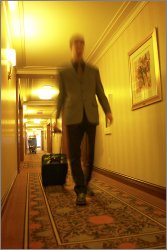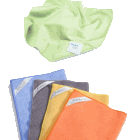Just How Germ-Infested are the Hotel Rooms You Stay In? What are the Risks?
by www.SixWise.com
Many Americans will spend the night in a hotel room 10 to
20 times a year, and some, particularly those who travel for
business, many more. While the last thing you want to think
about when you check into your home-away-from-home is what
might be lurking on the sheets, the bedspread, the shower
stall or the desk chair, a new study has found that it deserves
some attention.
|

ABC News investigators found traces of urine or semen
in every hotel room they tested.
|
Viruses Remain After Guests Check-Out
University of Virginia researchers decided to find out whether
rhinoviruses, the type of virus responsible for about half
of all colds, remain in hotel rooms after their host leaves.
"We know that viruses can survive on surfaces for a
long time -- more than four days," said Dr. Birgit Winther,
a University of Virginia ear, nose and throat specialist who
led the study.
For the study, 15 people with rhinovirus colds each spent
the night in a hotel room. After they left, 10 items they
had touched were tested for the rhinovirus, and one-third
were found to be contaminated. Specifically, the virus was
found on:
-
Seven out of 14 door handles
-
Six of 14 pens
-
Six out of 15 light switches, TV remotes and faucets
-
Five of 15 phones
-
Shower curtains, coffee makers and alarm clocks
"We were surprised to find so many," Winther said.
It's worth mentioning that the samples were taken before
the rooms were cleaned, so hotels' disinfecting processes
may remove some of the contaminants before a new guest checks
in.
"We do wipe everything down, from the remote control
to the telephone," said Michelle Pike, corporate director
of housekeeping for Hilton brand hotels.
The study concluded several months later when five of the
15 participants visited hotel rooms that had been deliberately
contaminated with their own mucus (which had been frozen while
they had their colds). Their hands were then tested for viruses,
which turned up on 60 percent of contacts in rooms where the
mucus had dried for at least an hour, and on 33 percent of
those in rooms where the mucus had dried overnight.
Bedbugs, Dried Semen and Urine
A separate study by ABC News Primetime also uncovered some
things you probably don't want to know about in hotel rooms.
The team visited 20 well-known hotels in New York, Miami,
Houston and Los Angeles, and used a black light to determine
how clean the rooms were.
|

Always remove the bedspread before lounging on a hotel
room bed -- they're usually not cleaned in between guests.
|
At every hotel they visited, from a one-star hotel with rates
at $55 a night to a five-star hotel with rooms that cost $400
a night, lab results showed evidence of urine or semen in
every room tested. Bed bugs have also turned up at even high-level
hotels. Some specifics:
-
Dried semen on the bedspread and urine stains on the
walls of a $300-a-night room in "one of New York's
finest hotels."
-
Trails of urine on the bedroom carpeting in a well-known
Miami hotel.
-
Traces of urine on the walls, bedspread, chairs, bathroom
vanity stool and carpeting near the bed at a four-star
resort.
"There's a lot going on behind those doors," said
Dr. Mark Callahan, a physician at New York Presbyterian Hospital.
"And the reality is that the hotels are not going to
be wiping down the walls and those surfaces."
Is Staying in a Hotel Room Risky?
Though the thought of leftover viruses, urine and other unmentionables
in your hotel room is disgusting, most experts say the risks
of actually getting sick from hotel germs is pretty low.
Still, 80 percent of infections are spread by someone touching
a germ-infested surface, or getting germ particles from a
sneeze, cough or touch onto their hands.
|
Make Your Hotel Room PerfectClean
 The
PerfectClean OfficePure Pack contains four ultramicrofiber
cloths that clean all the way down to the microscopic
level! Their revolutionary ultramicrofiber construction
enables them to reach deep into microscopic crevices
(NO other cleaning tool available even comes close!)
to actually remove dirt and bacteria, not just push
it around like ordinary cleaning rags. The
PerfectClean OfficePure Pack contains four ultramicrofiber
cloths that clean all the way down to the microscopic
level! Their revolutionary ultramicrofiber construction
enables them to reach deep into microscopic crevices
(NO other cleaning tool available even comes close!)
to actually remove dirt and bacteria, not just push
it around like ordinary cleaning rags.
They're completely portable, require no cleaning solution
to be effective, and can be used to wipe down all kinds
of surfaces, from doorknobs to the TV remote control.
Tuck one in your suitcase and be sure your hotel room
is clean down to the microscopic level!
Learn
more and order your PerfectClean OfficePure Pack now!
|
"Whether germs are viral, bacterial, or fungal, some
can remain active on most surfaces for several days -- no
matter whether the surface is stainless steel, wood, plastic,
or even the paper in a magazine," says Elaine Jong, MD,
co-director of the University of Washington Travel Clinic
in Seattle.
And while most hotels do lighter cleaning like dusting, vacuuming
and disinfecting daily, in reality, most hotels only do "deep"
cleaning four times a year, on average, which means there's
a good chance some germs may be left behind by the cleaning
people.
What can you do to minimize your risks and stay as germ-free
as possible while staying in a hotel? Plenty.
-
Wash your hands regularly and often. This is
particularly important before eating, touching your mouth,
eyes, nose or face, and after you've been out.
- Choose rooms that cost over $50 a night. Although
the ABC News study found contaminants in rooms of all price
ranges, University of Arizona microbiologist Charles Gerba,
PhD, who's also known as "Dr. Germ," believes
spending a little more may pay off.
"I did a study about seven years that found if you
paid more than $50 a night, there was a much greater chance
that the room was regularly disinfected. Rooms under $50
weren't."
-
Take off the bedspread. The bedspread is usually
full of contaminants, as it's often not cleaned in between
guests.
-
Pack your own sheets. If you're concerned about
what may be on the hotel sheets, just bring your own.
Alternatively, sleep in long-sleeved, long pants pajamas
and check the hotel sheets for rust-colored stains, which
may be a sign of bedbugs.
-
Carry with you, and use, sanitizing wipes. We
like the PerfectClean
terry cloths and super silk cloths, which have an
ultramicrofiber construction that enables them to reach
deep into microscopic crevices to actually remove microscopic
dirt and bacteria. Use them to wipe down surfaces that
may contain germs, such as the TV remote control, light
switches, bathroom faucet, and coffee maker handle.
-
Ask for an allergy-free room. Some hotels have
rooms that keep dust mites, allergens, and perhaps other
germs, to a minimum. Other hotels have "allergy packs"
that provide the guest with special pillows and mattress
covers (which may be cleaner than the regular variety).
-
Pack rubber thongs (flip-flops) or slippers.
Wear them at all times in the hotel room, rather than
walking barefoot.
Recommended Reading
The
Five Key Areas of Illness-Causing Germs & Toxins in Your
Home
The
Nine Grossest Things Other People Do That Can Make You Sick
Sources
CNN.com
September 29, 2006
ABC
News: What's Hiding in Your Hotel Room?
MedicineNet.com:
Germs are Everywhere -- Really
Reader's
Digest